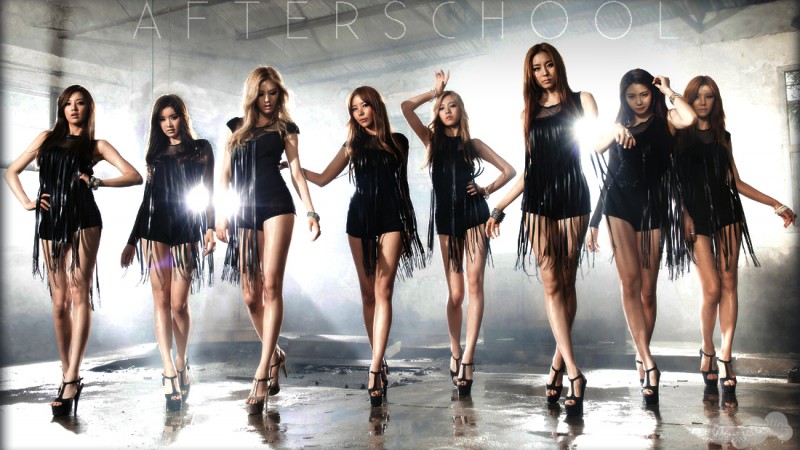 With the loss of their leader and most valuable member Kahi, the future of After School was questionable. Kahi figuratively and literally made this group, choosing the original roster personally. While that original group and its dynamics have faced major change over the years due to a graduation system that continually added and “graduated” members, Kahi was still the backbone of the group holding everything together. So with her departure, many were unsure of the longevity of After School as a group, ironic considering that the graduation system, the same system that allowed Kahi’s departure, was originally made to ensure longevity. After School’s most recent comeback with maxi-album Flashback was the girls’ chance to show they still had it in them to perform, that they could carry on, after the loss of the member that basically embodied them.
With the loss of their leader and most valuable member Kahi, the future of After School was questionable. Kahi figuratively and literally made this group, choosing the original roster personally. While that original group and its dynamics have faced major change over the years due to a graduation system that continually added and “graduated” members, Kahi was still the backbone of the group holding everything together. So with her departure, many were unsure of the longevity of After School as a group, ironic considering that the graduation system, the same system that allowed Kahi’s departure, was originally made to ensure longevity. After School’s most recent comeback with maxi-album Flashback was the girls’ chance to show they still had it in them to perform, that they could carry on, after the loss of the member that basically embodied them.
Overall a decent comeback, nothing about the album alone stood out as contradicting. The oxymoron lies, however, in the girls’ concept. Before the girls’ comeback, statements were being thrown around that this comeback was a call back of sorts to the sexy image and sultrier sounds of the original After School, a “flashback” of After School during their debit period. 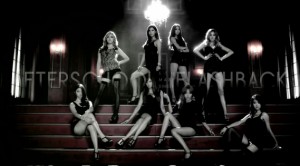 I appreciate that the girls went back to sexy as that is the concept that works best for them and also the few similarities in sound, but calling back to the past when the group should be focusing on moving forward definitely isn’t the best idea.
I appreciate that the girls went back to sexy as that is the concept that works best for them and also the few similarities in sound, but calling back to the past when the group should be focusing on moving forward definitely isn’t the best idea.
Both fans and Pledis Entertainment need to realize that the After School of yore and the After School now are basically are two completely different groups, and as such, should be handled differently. While they have the same title and some members still intact, the two are distinct and separate in image and ability. The After School of yore had a maturity and class to them that isn’t as evident in today’s After School due to the introduction of younger members. Kahi was really the only factor reminding the audience what that original what that After School was like as she basically embodied the traits highlighted in their original image. Remaining original members Jooyeon and Jungah also carry those traits, but they are more subdued in comparison to Kahi.
 So with Kahi — basically the last evident reminder keeping After School’s original image — gone, After School should have been treated basically as a new group, with whole new dynamics and a whole new sound as well. There was an evident time motif in this comeback, but instead of trying to conform to the After School of yore by focusing on the past, the girls should have focused on the future and embraced what this After School has become. That way, the loss of such a fundamental member wouldn’t have been as evident and the comparisons not as provoked. Furthermore, other than last year’s “Shampoo” and Japanese single “Lady Luck”, I’d argue that almost all of After School’s comebacks were leaning toward the sexy side, making it even more useless to call back on the past and bring upon all the ensuing comparisons.
So with Kahi — basically the last evident reminder keeping After School’s original image — gone, After School should have been treated basically as a new group, with whole new dynamics and a whole new sound as well. There was an evident time motif in this comeback, but instead of trying to conform to the After School of yore by focusing on the past, the girls should have focused on the future and embraced what this After School has become. That way, the loss of such a fundamental member wouldn’t have been as evident and the comparisons not as provoked. Furthermore, other than last year’s “Shampoo” and Japanese single “Lady Luck”, I’d argue that almost all of After School’s comebacks were leaning toward the sexy side, making it even more useless to call back on the past and bring upon all the ensuing comparisons.
The album itself was a fairly good effort. Like previously said, traces of the group’s original sound can be heard as there is a sultriness evident that is somewhat reminiscent of the sound the girls had during debut. But while traces can be heard, again, it’s not enough to justify the unneeded call back to the past, as this album, overall, has a more modern and club-like edge that the After School of now can identify with.
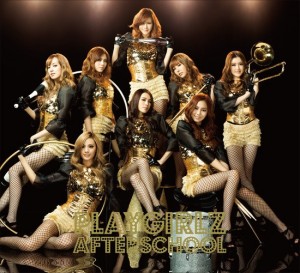 The album starts of with “Rip Off,” a remake of the song of the same name in the girls’ Japanese Playgirlz album. The track is full of very interesting sounds ranging from delicate bell-like noises to register sounds that add a bit of flair to this song. The verses of this song were also pretty memorable and catchy, and they worked pretty well with the beat of the instrumental. However, as interesting and quirky the instrumental is, it overpowers the vocals of the girls quite a bit, and there are moments where the vocals and instrumental don’t really match up.
The album starts of with “Rip Off,” a remake of the song of the same name in the girls’ Japanese Playgirlz album. The track is full of very interesting sounds ranging from delicate bell-like noises to register sounds that add a bit of flair to this song. The verses of this song were also pretty memorable and catchy, and they worked pretty well with the beat of the instrumental. However, as interesting and quirky the instrumental is, it overpowers the vocals of the girls quite a bit, and there are moments where the vocals and instrumental don’t really match up.
Also, seeing this song is a remake from the Japanese album, this song serves pretty a reliable basis of comparison of the sound of the group with and without Kahi. The Japanese version with Kahi has a more stable and lower tone as well as an overall more grounded feel while the Korean version is lighter and breathy. Otherwise, this song is probably the most consistent out of the faster-paced songs in the album.
The album then continues with title track “Flashback.” While the MV was a bit lacking as my fellow writer Fatouma pointed out in her review, it at least made the song more interesting. “Flashback” honestly is just too weak of a song to be a title track. Its hook — if it could even be called a hook — is boring and unmemorable, and there isn’t really anything attention-grabbing about it that wows upon first listen.
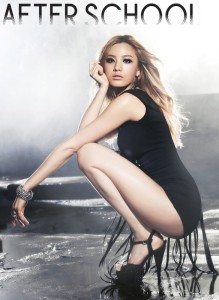 Furthermore, the song is so clearly broken up into pieces, and there isn’t much transition to put those pieces together and let one appreciate the song as a whole. The random dubstep dance-break and Nana’s rap-talking was unappealing and somewhat misplaced, and the overall instrumental isn’t anything new or noteworthy either. “Flashback” is a track that admittedly grows on you, becoming more and more appealing the more you listen to it as you recognize and anticipate the more memorable parts of the song that are pretty widely spread and live through the unappealing ones.
Furthermore, the song is so clearly broken up into pieces, and there isn’t much transition to put those pieces together and let one appreciate the song as a whole. The random dubstep dance-break and Nana’s rap-talking was unappealing and somewhat misplaced, and the overall instrumental isn’t anything new or noteworthy either. “Flashback” is a track that admittedly grows on you, becoming more and more appealing the more you listen to it as you recognize and anticipate the more memorable parts of the song that are pretty widely spread and live through the unappealing ones.
Next track on the album is “Eyeline,” a solo by Nana. Many people find Nana’s getting of a solo and overall newly found attention unreasonable, and even I agreed to some extent. Nana’s skills as it is isn’t deserving enough to carry a solo song, but honestly, after main vocals Jungah and Raina (who already got a duet in this album), Nana would probably be the next in line to be able to pull it off as she has enough charisma to do so.
However with “Eyeline”, that charisma doesn’t show at all. There wasn’t really any emoting in the song, and Nana even sounded bored to an extent throughout. Also, Nana’s light voice has a bit of an underlying strength to it that is more suited and appreciated in ballads rather than tracks like these where it sounds lifeless. Furthermore, the song is full of the sing-talk thing that’s plaguing K-pop recently, and overall, this track doesn’t live up to standards. In this five-tracked album, only three featured the entire group. I would have rather traded the space “Eyeline” took for another group song as that way, at least all the group members have more time to shine.
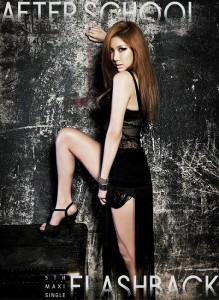 Following “Eyeline,” the album slows down considerably with track “Wristwatch.” After School’s ballads really manage to surprisingly impress, and this one doesn’t disappoint either. The vocals in this song were on-point and strong. Of course, Jungah and Raina sounded great, and Nana manages to shine in this song. Furthermore, improvements can be heard in the voices of Jooyeon and Lizzy, who both sounded stronger in this song. “Wristwatch” is probably the strongest in this album, helping it increase a bit quality.
Following “Eyeline,” the album slows down considerably with track “Wristwatch.” After School’s ballads really manage to surprisingly impress, and this one doesn’t disappoint either. The vocals in this song were on-point and strong. Of course, Jungah and Raina sounded great, and Nana manages to shine in this song. Furthermore, improvements can be heard in the voices of Jooyeon and Lizzy, who both sounded stronger in this song. “Wristwatch” is probably the strongest in this album, helping it increase a bit quality.
The last track of the album is “Timeless,” a duet of sorts between the main vocalists of the group, Raina and Jungah. It was a about time these two get a duet, and again, they manage to deliver. The acoustics and Raina and Jungah’s more delicate delivery create a pleasant and relaxing piece that’s very easy on the ears. The two sounded pretty amazing together with Jungah’s huskier and fuller voice balancing the flaws heard in Nana’s lighter voice, and the song is able to leave you with a good note at the end of the mediocre album. My only real complaint about this song is that I wish the girls stretched their vocals a bit more. I mean down-low tracks are just as pleasing, but if you’re gonna call on your two strongest vocalists, you might as well show off their skills.
A change in dynamics occurred with Kahi’s departure, and it’s evident with Flashback. However, while it may be one of the girls weaker and more forgettable comebacks, I wouldn’t call it useless. Actually, for the first time since the girls’ debut, I actually see the graduation system fulfill its desired effects. 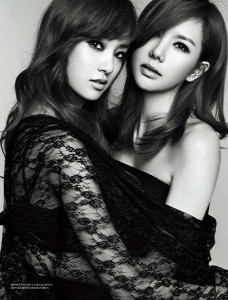 I previously gave my two cents about After School’s graduation system in a previous article, but I never thought I’d ever see the day when it’s actually working for good.
I previously gave my two cents about After School’s graduation system in a previous article, but I never thought I’d ever see the day when it’s actually working for good.
Before, After School having a graduation system was useless since one member, Kahi, carried the entire group. However, with Kahi’s departure, group dynamics changed, and the presence of other members can be felt and their roles have become more even and established. Not only has the line distribution been a lot more fair lately, in a way, the girls have also sort of grouped themselves into tiers according to seniority.
For the first time, I can somewhat feel Jungah’s and Jooyeon’s importance to the group as original members, being the only members remaining, and now being the ones to lead the group, a role only exclusively Kahi previously played. Uee‘s seniority can be felt, and the girls of Orange Caramel stopped being the youngest, with that role now given to E-young and Kaeun. Instead, Nana, Raina, and Lizzy are elevated into more senior members and eventually potential leaders when the time comes, actually making it more reasonable that they be the ones to carry most of the group’s songs. And E-young and Kaeun’s roles as the youngest now somewhat justifies their relative lack of lines. As the new girls, they have to gain a bit of seniority and experience before they are able to get lines. While I have yet to be impressed with Kaeun’s supposed vocal capabilities since her lack of lines kept it from being showcased, it makes more sense convincing people that she wasn’t added to replace the fundamental role Kahi played. Instead she’s the new girl who would get her time to show her skills if she has them. In this way, if this dynamic can be kept and perfected, After School can actually keep longevity.
Overall, despite having some contradictions in their concept and a bit of trouble picking themselves up, I feel the girls of After School are able to live on carry themselves without Kahi once they get the hang of the new dynamics. Flashback may not be their strongest comeback, but it is far from useless.
Recommended: “Wristwatch”
Worth a Listen: “Timeless” and “Rip Off”
Weakest Links: “Flashback” and “Eyeline”
Ultimately, After School’s Flashback deserves a 2.9/5. What do you think, Seoulmates? Was After School’s Flashback useless and a total rip off? Or did you think it has potential to be timeless?
(Pledis Entertainment, Wikipedia, eisya99cute, SnowprinceAFSC1)
